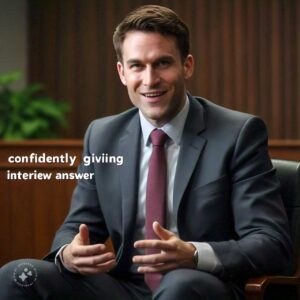Making a Lasting Impression
Job interviews are often intimidating, especially when you feel the pressure to give the “right” answers and avoid saying something that could harm your chances. But here’s the reality: getting an answer wrong, giving a less-than-perfect response, or even making a small mistake aren’t the biggest risks you face. The greatest danger in any job interview is making no impression at all.
Imagine this: The hiring manager interviews you and three, five, or even fifty other candidates in a short span of time. A day or two passes, and as they try to recall who stood out, they can’t quite remember who you are or why you were different. In a job market full of skilled and qualified candidates, being memorable can make all the difference between landing the job and being forgotten. So, how can you ensure that you stand out and leave a lasting, positive impression?

In this guide, we’ll explore some simple, actionable steps that will help you stand out in your next job interview.
—
- Know Your Unique Strengths and Communicate Them Clearly
A key step in standing out is understanding and articulating what makes you unique. This is more than just listing your skills or experiences; it’s about framing your strengths in a way that demonstrates what you bring to the table that no one else does.
Identify your unique strengths: Think about your career journey, skills, and personality traits. What experiences have shaped you? Maybe you have a skill set that’s rare in your field, or you’ve overcome challenges that have taught you resilience.
Connect your strengths to the role: Don’t just state your skills; connect them to the role you’re interviewing for. For example, if you’re applying for a project management role and you’re great at organizing chaos, you could say, “I’ve always excelled in creating order out of chaos, which is why I’m particularly drawn to roles where there are complex projects to manage.”
Prepare a few stories: Share brief but impactful stories that illustrate your strengths. If you’re great at problem-solving, share a specific example where your skills helped the team overcome a big challenge.
—
- Research the Company Deeply and Show Genuine Interest
Employers want to hire someone who is not only qualified but also genuinely interested in their company. Demonstrating that you’ve done your homework can make you a memorable candidate.
Go beyond the basics: Instead of just knowing the company’s mission statement, look up recent news, learn about their competitors, and study their products or services. Get a sense of their culture, values, and goals.
Align your answers to their needs: When asked questions, link your skills and experiences back to the company’s specific goals or projects. For instance, if you know they’re working on expanding their digital presence, mention any relevant experience you have with digital marketing or content creation.
Ask insightful questions: Prepare thoughtful questions that show you’re invested. Avoid generic questions like “What’s a typical day like?” Instead, ask questions like, “How does this role support the company’s vision for growth?” or “Can you tell me about the qualities you see in your most successful employees?”
—
- Make a Strong First Impression
First impressions can have a powerful impact on how you’re remembered. From the moment you walk into the room (or start the virtual call), think about how you present yourself.
Dress the part: Choose attire that fits the company culture while still looking professional. If you’re interviewing at a tech startup, business casual might be fine, whereas a more formal setting may require a suit or business attire.
Mind your body language: Body language speaks volumes. Sit up straight, maintain good eye contact, and avoid fidgeting. A strong, friendly handshake (if in person) and a warm smile can also help set the tone.
Bring a positive attitude: Being upbeat, energetic, and genuinely enthusiastic can leave a lasting impression. People remember those who bring a positive vibe to the room, so don’t underestimate the power of a smile and a good attitude.
—
- Showcase Your Soft Skills Alongside Your Hard Skills
While hard skills are essential, employers are increasingly valuing soft skills, such as communication, teamwork, and emotional intelligence. Demonstrating these can set you apart from candidates who focus only on technical abilities.
Show, don’t tell: Instead of just saying you’re a good communicator or a team player, give examples. If asked about your strengths, share a story about a time you used those skills in a real-world scenario.
Emphasize adaptability and resilience: Employers want candidates who can handle change and stay calm under pressure. Share examples of times when you adapted to new challenges or worked through difficult situations.
Practice active listening: Don’t be so focused on your responses that you overlook listening. Nod to show understanding, give thoughtful pauses, and make eye contact to show engagement. Active listening is a powerful way to show respect and build rapport with your interviewer.
—
- Emphasize Your “Cultural Fit” and “Cultural Add”
In today’s job market, companies often look for candidates who fit their culture and can also bring a fresh perspective to it. Showing that you align with their values and culture can be a powerful way to stand out.
Understand their culture: By researching the company, get a sense of whether they value collaboration, innovation, diversity, or any other aspect of work culture. Align your answers and examples to reflect that you share these values.
Highlight your “cultural add”: Don’t just try to fit in; show how you can bring something new to the team. For example, if you’re interviewing at a company that values innovation, you might say, “I bring a background in creative problem-solving, and I’d love to contribute fresh ideas to the team.”
—
- Prepare for the “Why Should We Hire You?” Question
One of the most common but powerful interview questions is, “Why should we hire you?” This is your opportunity to summarize your unique qualities and demonstrate what makes you different.
Keep it concise and impactful: Summarize your key skills, experiences, and how they specifically benefit the company. You might say, “I bring a blend of technical expertise and strong interpersonal skills that allow me to work seamlessly with diverse teams. I believe my background in both project management and data analysis would be an asset in helping this team achieve its goals.”
Show confidence without arrogance: Be confident but humble. Use phrases like, “I’m confident that my skills can make a positive impact,” instead of, “I’m the best person for the job.”
—
- End with a Memorable Closing Statement
As the interview wraps up, you have one last chance to leave a memorable impression. This can be as simple as a closing statement that reinforces your enthusiasm and gratitude.
Reaffirm your interest and fit: Say something like, “I’m genuinely excited about the opportunity to join your team and bring my skills to support the company’s vision.”
Express gratitude: Thank them for their time and consideration. A sincere, well-phrased thank you can go a long way.
Leave them with a final impression: If possible, end with a memorable sentence that highlights your excitement and positive attitude, such as, “I look forward to the possibility of working together to drive innovation in the team.”
—
Conclusion: How Will You Be Remembered?
Remember, the biggest danger in any job interview isn’t saying something wrong or not knowing an answer—it’s making no impression at all. Your goal should be to stand out as someone memorable, skilled, and aligned with the company’s goals and culture. This means understanding your unique strengths, preparing your stories, making a strong first impression, and showing genuine interest in the company.
With preparation and a positive attitude, you can leave an impression that makes the hiring manager think about you well after the interview ends. This isn’t about having all the right answers—it’s about being the candidate who stands out, who brings something unique, and who leaves the interviewer with a sense that they’ve met someone they want on their team. So, as you prepare for your next interview, think about how you want to be remembered and take steps to ensure you stand out in a way that truly reflects your strengths and potential.



